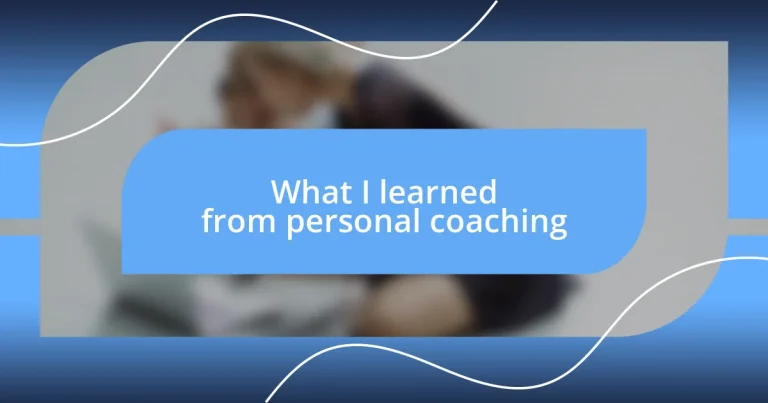Key takeaways:
- Personal coaching clarifies goals and fosters accountability, transforming vague ambitions into specific, actionable steps.
- Enhancing self-awareness reveals limiting beliefs and emotional triggers, leading to personal growth and informed decision-making.
- Evaluating progress and celebrating achievements, no matter how small, builds motivation and reinforces a sense of accomplishment.
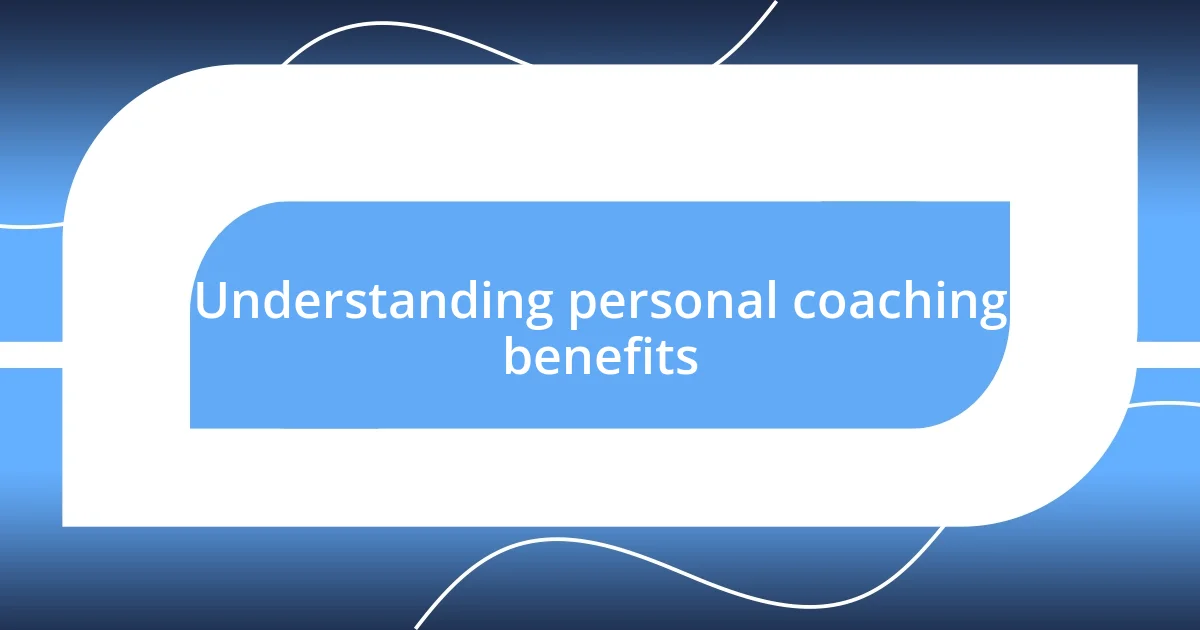
Understanding personal coaching benefits
One of the most significant benefits of personal coaching is the way it helps clarify goals. When I began working with a coach, I was overwhelmed by choices and lacked direction. Through our sessions, I discovered that articulating my aspirations led to a clearer path forward—something I never realized I needed until I experienced it firsthand.
Personal coaching also provides a safe space for accountability. Have you ever felt like you were all talk and no action? I know I have. My coach encouraged me to set milestones and check in consistently, which transformed my intention into tangible results. The support and encouragement I received made me more committed to my goals than I ever thought possible.
Another remarkable aspect of personal coaching is the boost in self-awareness it fosters. I remember a moment when my coach pointed out a pattern in my thinking that I hadn’t recognized. It was a bit unsettling, yet incredibly liberating. Realizing how my mindset shaped my actions opened up new avenues for growth that I hadn’t considered before. Have you ever had an eye-opening moment like that? It can genuinely change the way you move through life.
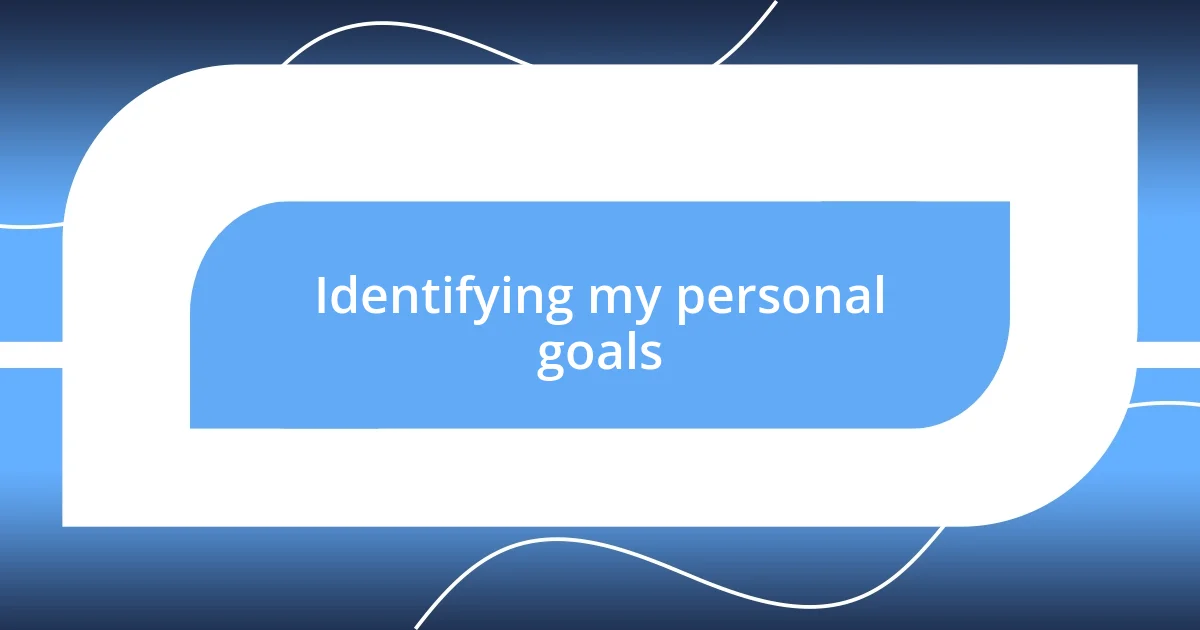
Identifying my personal goals
Identifying personal goals can be a daunting process, but I found it to be one of the most rewarding experiences during my coaching journey. Initially, I listed vague ambitions like “be happier” or “achieve success.” However, my coach challenged me to dig deeper. By asking probing questions and encouraging reflection, I was able to break those broad concepts down into specific, actionable goals. For example, instead of just wanting to “be happier,” I realized I needed to prioritize self-care and build deeper connections with friends.
One particular session stands out in my memory. My coach introduced a visualization exercise where I imagined my life five years from now. I could see myself thriving in a career that aligned with my passions, surrounded by loved ones. This exercise didn’t just highlight what I wanted; it vividly illustrated the steps I needed to take to get there. I walked away from that session feeling rejuvenated and equipped with a roadmap tailored to my true aspirations.
Through this experience, I learned that identifying personal goals isn’t just about creating a checklist. It’s about understanding your values and passions. When I connected my goals to what truly matters to me, the whole process became exhilarating. Have you had an experience where your goals became clearer after reflecting on them? It can really light a fire under you when you align your aspirations with your core values.
| Vague Goals | Clear Goals |
|---|---|
| Be happier | Prioritize self-care and build deeper friendships |
| Achieve success | Grow my career in a field that excites me |
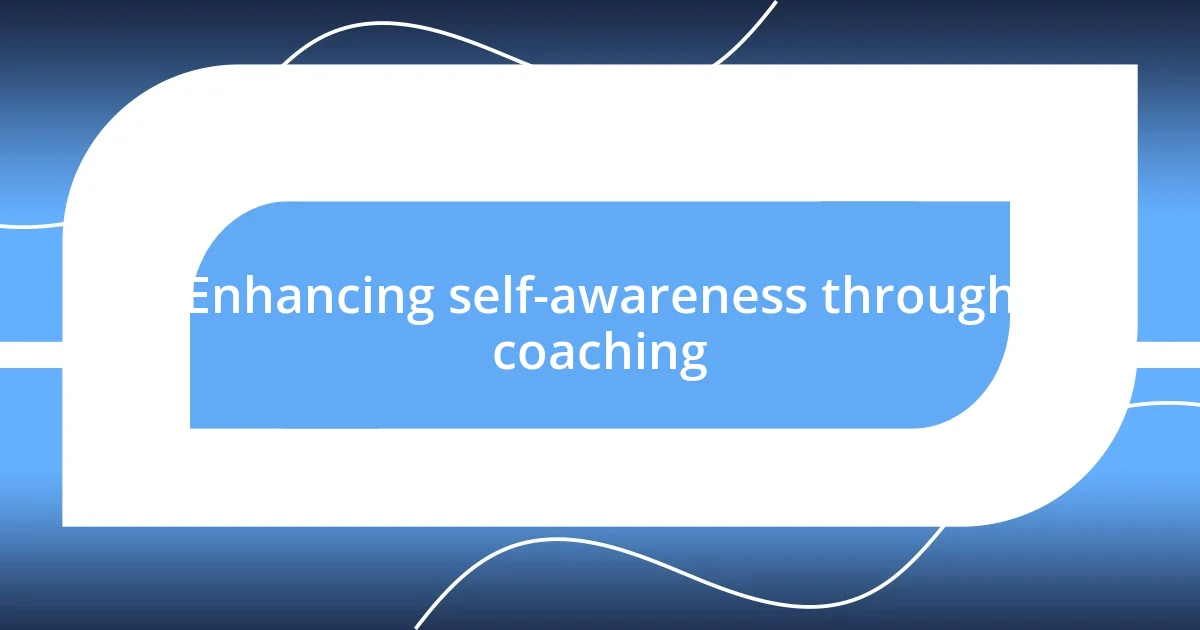
Enhancing self-awareness through coaching
Enhancing self-awareness is a profound journey that can transform how we view ourselves and our interactions. During my coaching experience, I often found myself confronting uncomfortable truths. One session stands out vividly—I was surprised to learn how my fear of failure influenced my decision-making. My coach gently guided me through this realization, and it felt like lifting a fog that had clouded my judgment for years. Recognizing this pattern was the first step toward changing it.
- Increased understanding of personal values
- Clarity on limiting beliefs and thought patterns
- Identification of emotional triggers and their impact on behavior
- Ability to reflect critically on past decisions
As I delved deeper into self-awareness, I started to notice how my upbringing and experiences shaped my reactions. I enrolled in an exercise where my coach asked me to journal daily about my feelings. Reflecting on my entries, I slowly unraveled how my childhood experiences influenced my self-esteem. These revelations were at times painful, but they opened doors to growth I never thought possible. Each insight brought a sense of freedom, empowering me to make choices that better aligned with my true self.
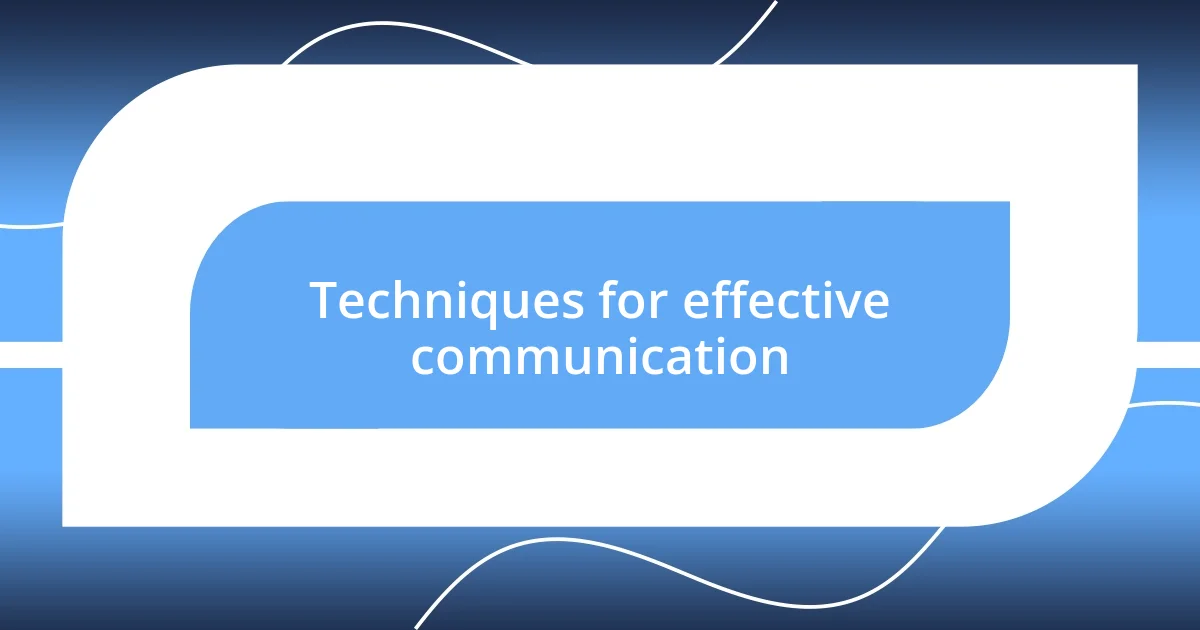
Techniques for effective communication
Effective communication is a skill that requires practice and intentionality. One technique I found incredibly valuable was active listening. In my coaching sessions, I learned to truly listen—not just waiting for my turn to speak. I began to focus on the speaker’s words, tone, and body language, which allowed me to respond more thoughtfully. Have you ever noticed how much more connected you feel when someone genuinely listens to you? It’s a game changer!
Another technique I embraced was the use of “I” statements. Instead of saying, “You make me feel upset,” I rephrased it to, “I feel upset when…” This shift not only helped me express my feelings without sounding accusatory but also opened up a constructive dialogue. It made me realize how often we unintentionally place blame on others, which can shut down communication rather than foster it. Has this ever happened to you in a conversation?
Furthermore, I learned the importance of non-verbal communication—those subtle cues that often speak louder than words. In one session, my coach pointed out how my crossed arms could be perceived as defensiveness, even when I didn’t intend it. Paying attention to my posture and facial expressions not only helped me convey my messages more effectively but also made me more aware of how others might perceive my signals. It’s fascinating how a small adjustment in body language can completely change the dynamics of a conversation, isn’t it?
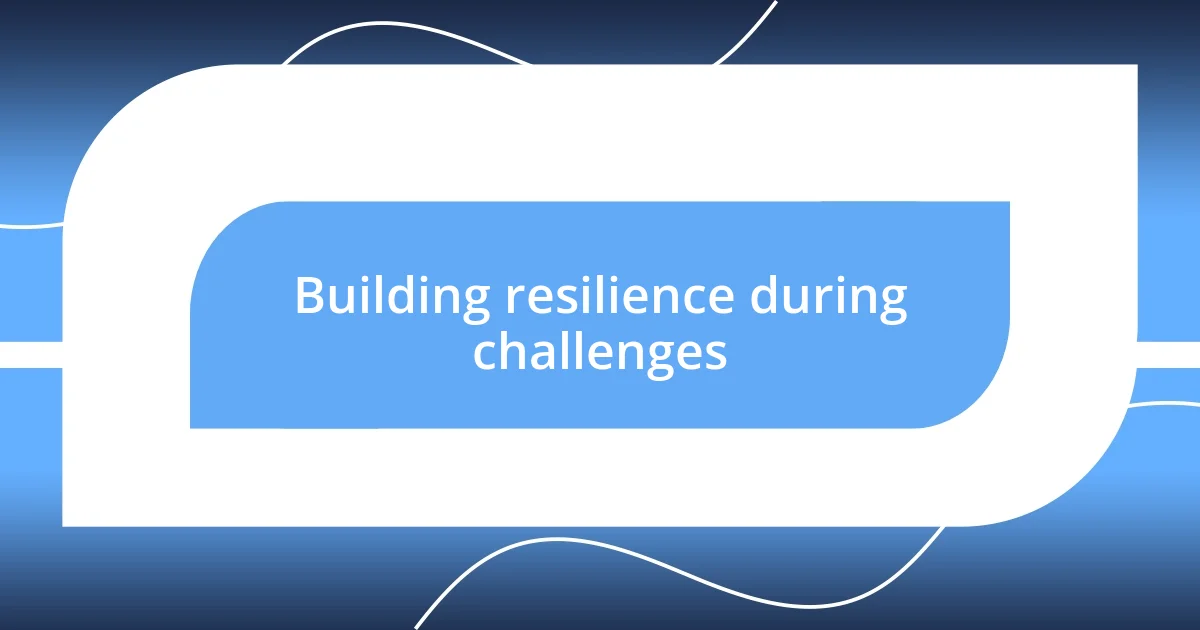
Building resilience during challenges
Building resilience during challenges is something I really learned to embrace throughout my coaching journey. There was a particular moment when I faced a career setback that left me feeling disheartened. My coach encouraged me to view obstacles as opportunities, which initially felt like an empty platitude. However, reflecting on that moment allowed me to see it differently: each challenge was a chance for personal growth, teaching me how to adapt and overcome.
It’s interesting to note how resilience isn’t just about enduring hardship; it’s also about recognizing our emotional responses. One day, as I voiced my frustration over unexpected setbacks, my coach helped me identify those feelings as stepping stones rather than stopping points. Instead of succumbing to despair, I learned to sit with my emotions, understand them, and then channel them into actionable plans. Have you ever paused to consider how your feelings can shape your response to challenges?
I remember a session where we practiced visualization techniques to strengthen my mental resilience. I imagined myself navigating through a storm, realizing that rather than wishing for calm seas, I could learn to sail better. This metaphor resonated deeply with me—I understood that life’s unpredictability would always be there, but my ability to adapt and maintain focus would be my true strength. Isn’t it empowering to think that resilience is like a muscle we can develop over time?
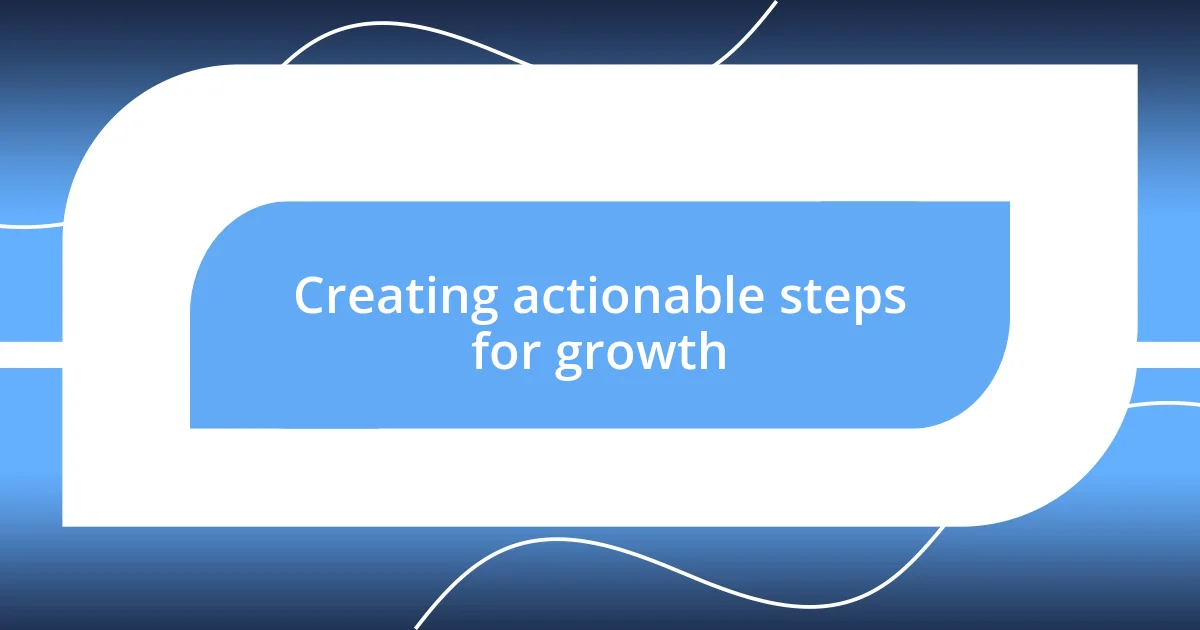
Creating actionable steps for growth
Creating actionable steps for growth involves breaking down ambitions into manageable, concrete tasks. During my coaching experience, I was encouraged to set SMART goals—specific, measurable, achievable, relevant, and time-bound. For instance, rather than saying, “I want to get better at public speaking,” I transformed it into, “I will practice speaking in front of a small group once a week for the next month.” This clarity gave me a sense of direction that I had previously lacked. Have you ever felt overwhelmed by a big goal and not known how to start?
Another pivotal lesson I learned was the power of accountability. My coach urged me to share my goals with a trusted friend or colleague. Just sharing my intentions not only amplified my commitment but also broadened my support network. One day, I mentioned my goal of writing a blog post every week, and my friend began checking in on my progress. This connection made me feel more motivated. Isn’t it fascinating how a little external encouragement can motivate us to move forward?
I also realized that reflection is essential in creating actionable steps for growth. After each goal cycle, I would take time to assess what worked and what didn’t. There were instances where my plans required adjustments, and that was okay! Instead of viewing this as failure, I chose to see it as an opportunity for refinement. Have you ever felt that a setback was actually a stepping stone to something greater? Learning to embrace feedback and iterate on my plans transformed my approach to growth, highlighting a dynamic process rather than a rigid path.
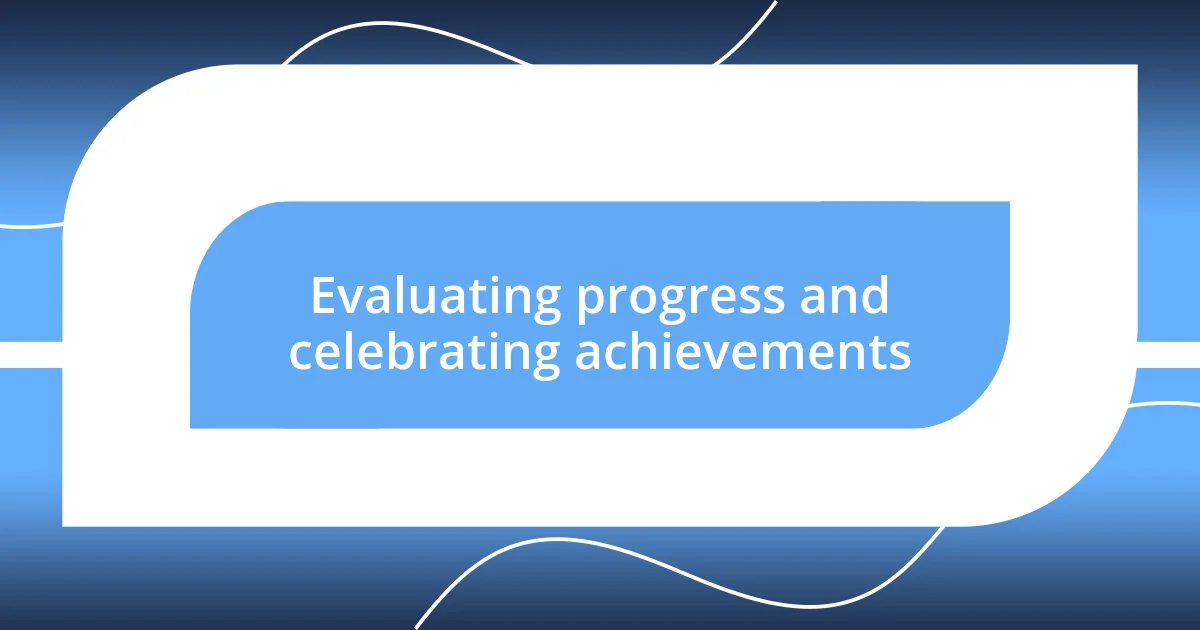
Evaluating progress and celebrating achievements
Evaluating progress is like holding up a mirror to your journey. I remember vividly checking in with my coach after a month of working on my goals. Seeing how far I had come, even in those small steps, gave me this rush of motivation. Have you ever felt that surge of pride when you realize your efforts are paying off? It’s that moment that fuels me to keep pushing forward.
Celebrating achievements should be a joyful ritual, not an afterthought. One day, after I completed a tough project, my coach suggested we celebrate the milestone with a simple treat—something sweet and satisfying. Sharing that moment was more than just enjoying a dessert; it was about acknowledging the effort and perseverance it took to get there. Do you take the time to celebrate your wins, no matter how small, or do you brush them aside?
During my coaching sessions, I developed a personalized “success diary,” where I documented every little victory along with my feelings about them. This practice helped me to not only track progress but also savor those moments of joy. Recently, I reflected back on a time when I landed a speaking opportunity that initially seemed far out of reach. Flipping through those pages, I could feel the same excitement wash over me again. How do you remind yourself of your successes and keep that spark alive?












